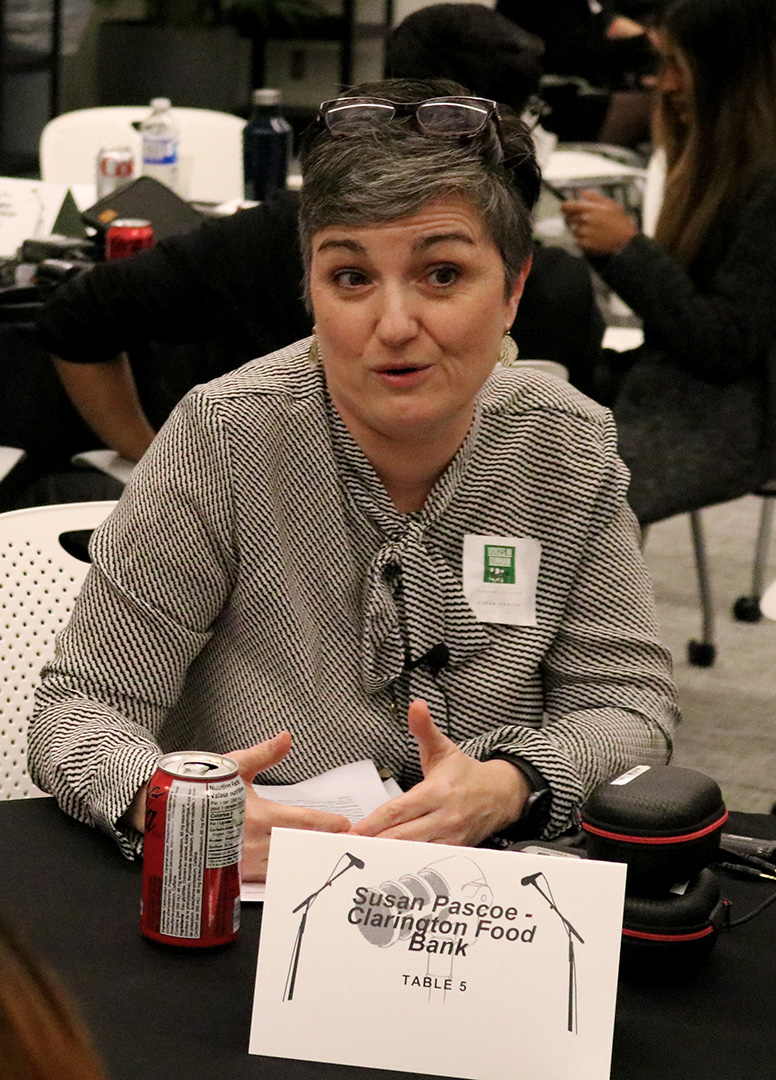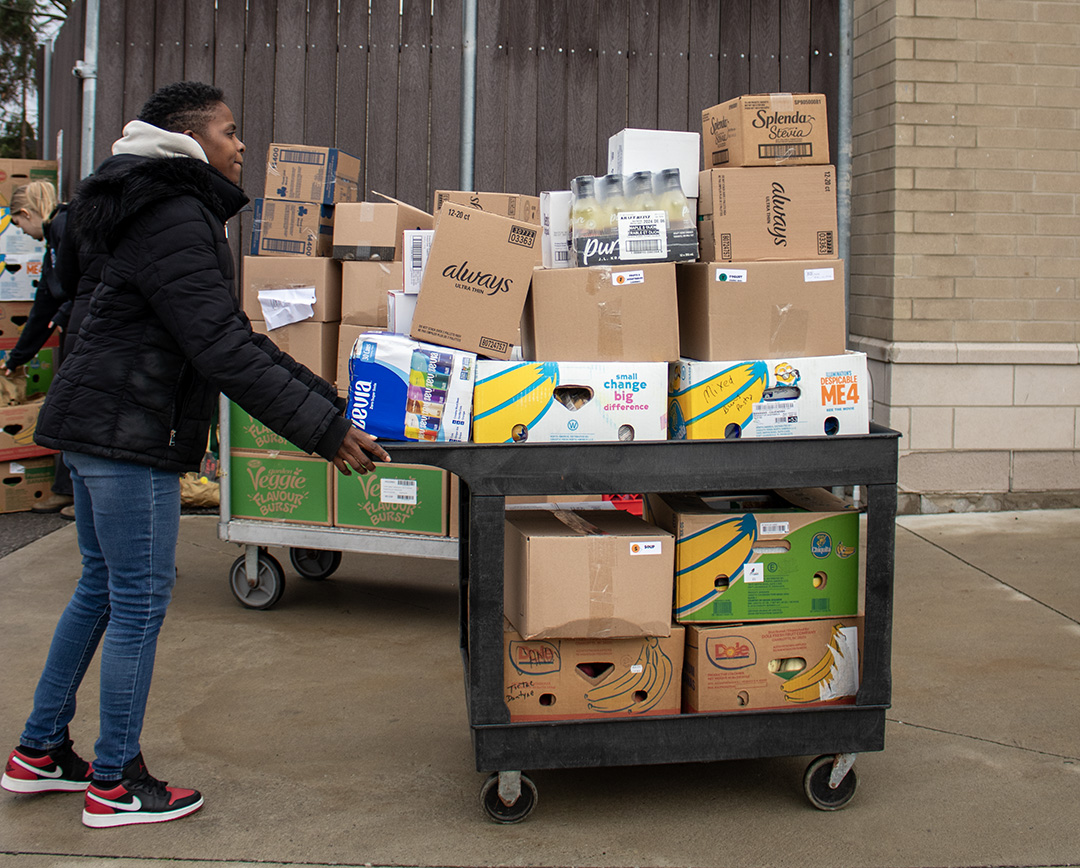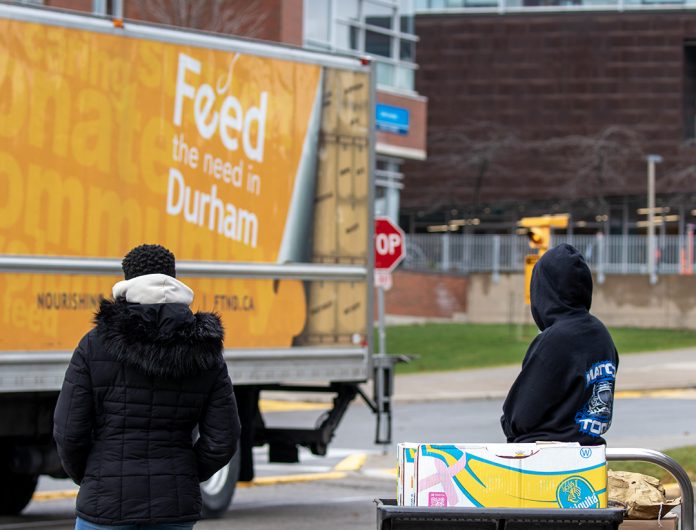“I wasn’t sure what to expect,” recalls a woman who first walked through the doors of the Clarington East Food Bank a year ago. Instead of judgment, she found compassion and warmth.
Walking into the food bank between Mill St. and Church St. feels like stepping into a small, welcoming supermarket. Volunteers guide visitors through shelves of essential items with a shopping cart in hand.
“Once I got past that first step, it was like a dream,” said the woman who wishes to remain anonymous. “Everyone was so kind and helpful. It really felt like family.”
As inflation rises, many residents in Durham Region are struggling to cover basic needs, pushing them to rely on food banks and support programs. Over 52 per cent of food-insecure households are employed, and 18 per cent of lone-parent families with children under 25 struggle with food insecurity, according to The Price of Eating Well in Durham Region 2023. .

Housing affordability adds another burden, with the average price of a new single-detached home in the region increasing by 21.9 per cent in 2023 to over a million dollars. Inflation rates continue to climb, reaching 2 per cent in October 2024 from 1.6 per cent the previous month, according to Statistics Canada.
Organizations like the Clarington East Food Bank, Feed the Need in Durham, and North House are stepping in to address these growing challenges.
For the woman who started to use the food bank a year ago, the impact extended beyond food. During one of the most difficult periods of her life, the Clarington East Food Bank became a critical lifeline.
“Susan and Tracy (assistant manager) were there every step of the way,” she said. “They didn’t just provide food; they helped me navigate my father’s end-of-life care. Their support was invaluable.”
Susan Pascoe, executive director of the Clarington East Food Bank, said many people rely on the food bank for more than food.

“For some, we are the only family they have,” said Pascoe. “Many are alone, isolated, and dealing with mental health issues. They might be estranged from their families or unable to work.”
The Durham Region Health Department found that in June 2023, the cost of a basic healthy diet for a family of four was $1,173 per month, an 11 per cent increase from 2022.
“A single person only receives about $733 a month to survive,” said Stella Danos-Papaconstantinou, commissioner of social services for Durham Region. “So often, these same individuals end up becoming homeless.”
Families on fixed incomes face impossible decisions between paying for food and rent.
“If your Ontario Disability Support Program check is $1,300 a month, how are you going to afford housing or transportation to work?” Pascoe said.
“When you don’t have basic needs, it encompasses every aspect of your daily life from when you wake up to when you finally get to sleep.”
Danos-Papaconstantinou stressed the importance of living wages. “Minimum wage rose to $17.20, but in Durham, a family needs $21.65 an hour to live comfortably,” she said.
Food banks are no longer temporary solutions.
“Twenty per cent of our clients have relied on us for 15 years or more,” Pascoe said, reflecting the chronic nature of food insecurity.
Ben Earle, CEO of Feed the Need in Durham, said his organization has seen an exponential increase in demand across the 70 food programs it supports.

“Inflation has had a direct impact on the significant demand increases that we’ve seen in the last few years for food banks,” said Earle.
A notable shift in demographics has been in the “income profile,” he added.
“We’re seeing more and more people who have higher incomes than we would have had traditionally, more people who are working full-time or even part-time.”
Earle explained how inflation outpacing wages is leaving many employed households struggling to meet their basic needs: “Most people are struggling to buy the same amount of food that they could previously buy because their wages just aren’t keeping up with that inflation, even if they’re making a decent wage.”
Many individuals are turning to food banks not just for food but to help make ends meet.
“Some people are coming when they can’t pay other bills. If they had to buy all their groceries, they might not make their rent. People are saying, ‘I’m able to pay my rent because I know I can supplement my food budget with what I get from the food bank,’” Earle said.
Earle said people come in and say, ‘My partner and I work full-time. We’ve got decent jobs, but our mortgage rate changed in the last year from 2 per cent to 6 per cent, and now we are paying $800 to $900 more a month.’
“That cushion they had is gone,” Earle said.
Mortgage rates are also squeezeing budgets. The average monthly payment for new mortgages in Oshawa rose 27.6 per cent between 2022 and 2023, from $1,953 to $2,492, according to Ratedotca.

In 2022, more than 29,000 households accessed Durham Region’s homelessness support system. Of the 1,446 people who stayed in shelters, 872 were first-time users, according to Durham Region.
Jennifer MacKay, manager of housing services at North House, said her organization is seeing a growing number of people seeking help due to inflation.
“It could be they’re at risk of eviction or just experiencing economic instability,” she said. “Most notably, we see people now who potentially wouldn’t have accessed our services before, but because of the cost of living, now find themselves needing help.”
North House, located in Uxbridge, serves Uxbridge and Scugog townships and provides support to all adults from 18 up to seniors, including men, women, families, and individuals facing housing instability or homelessness.
“If somebody comes to us facing homelessness, where they don’t have anywhere to go, we help them get connected to an emergency shelter,” said MacKay.
“It’s really hard because everybody’s situation is an emergency. Everybody who comes to us is in need but in different stages of need.”
Unsheltered homelessness is growing, with an additional 42 people experiencing homelessness every month in 2022—a 67 per cent increase from the previous year, according to Durham Region Policy Paper.
“Homelessness in North Durham looks different; it’s not as visible as in South Durham,” MacKay said. “It could mean people staying with family members, couch surfing, or living in their vehicles. Sometimes people are sleeping in forests or off trails—they don’t have a permanent place to rest.”
Pascoe, who established the shopping model at the Clarington East Food Bank, pointed out that people aren’t choosing this.
“Nobody wakes up and says, ‘I don’t want to have a place to sleep.’ Nobody wakes up and says, ‘I don’t want to be able to feed my kids.’ Life puts them in these situations.”
Donations to support these organizations are accepted through their websites, offering hope and relief to those in need.





